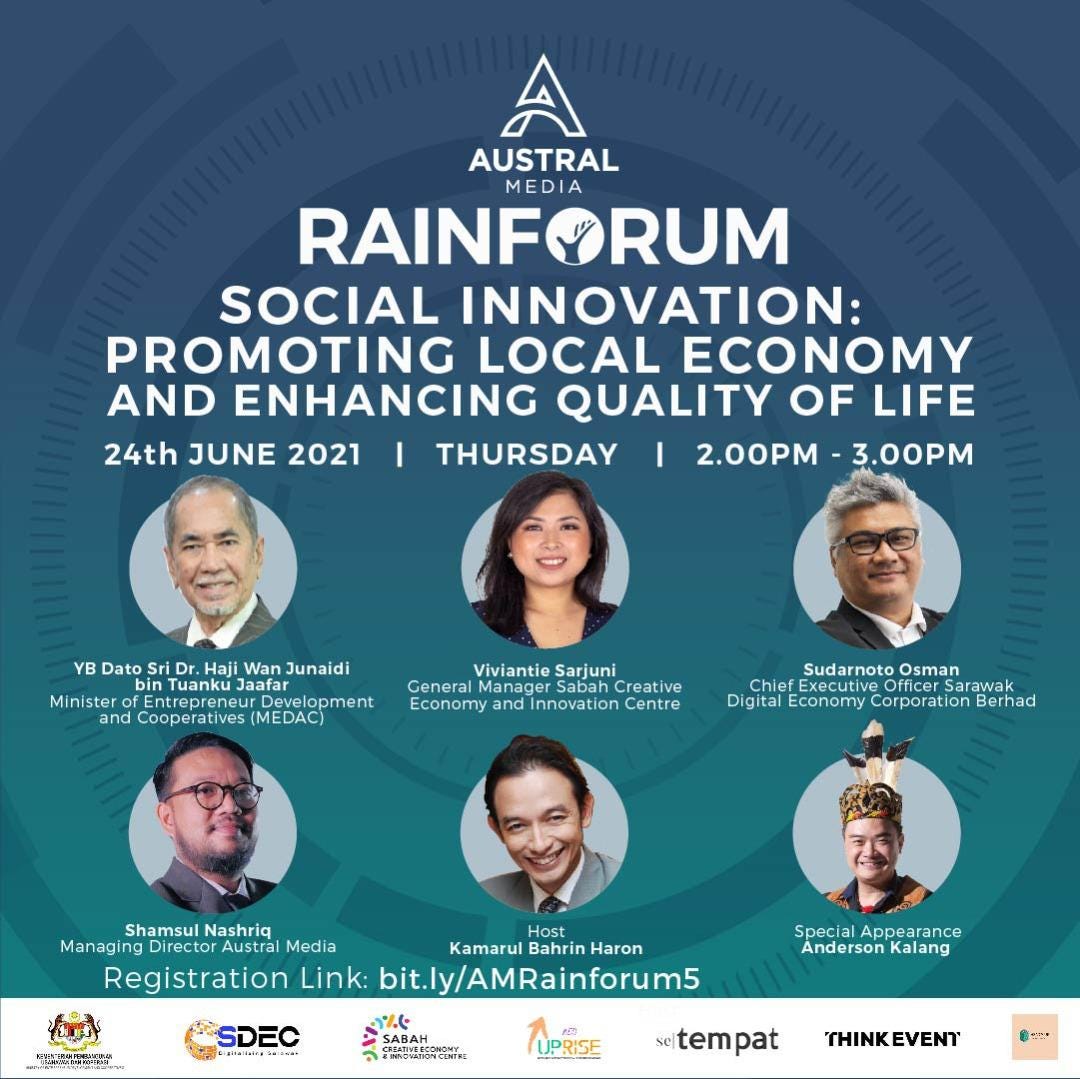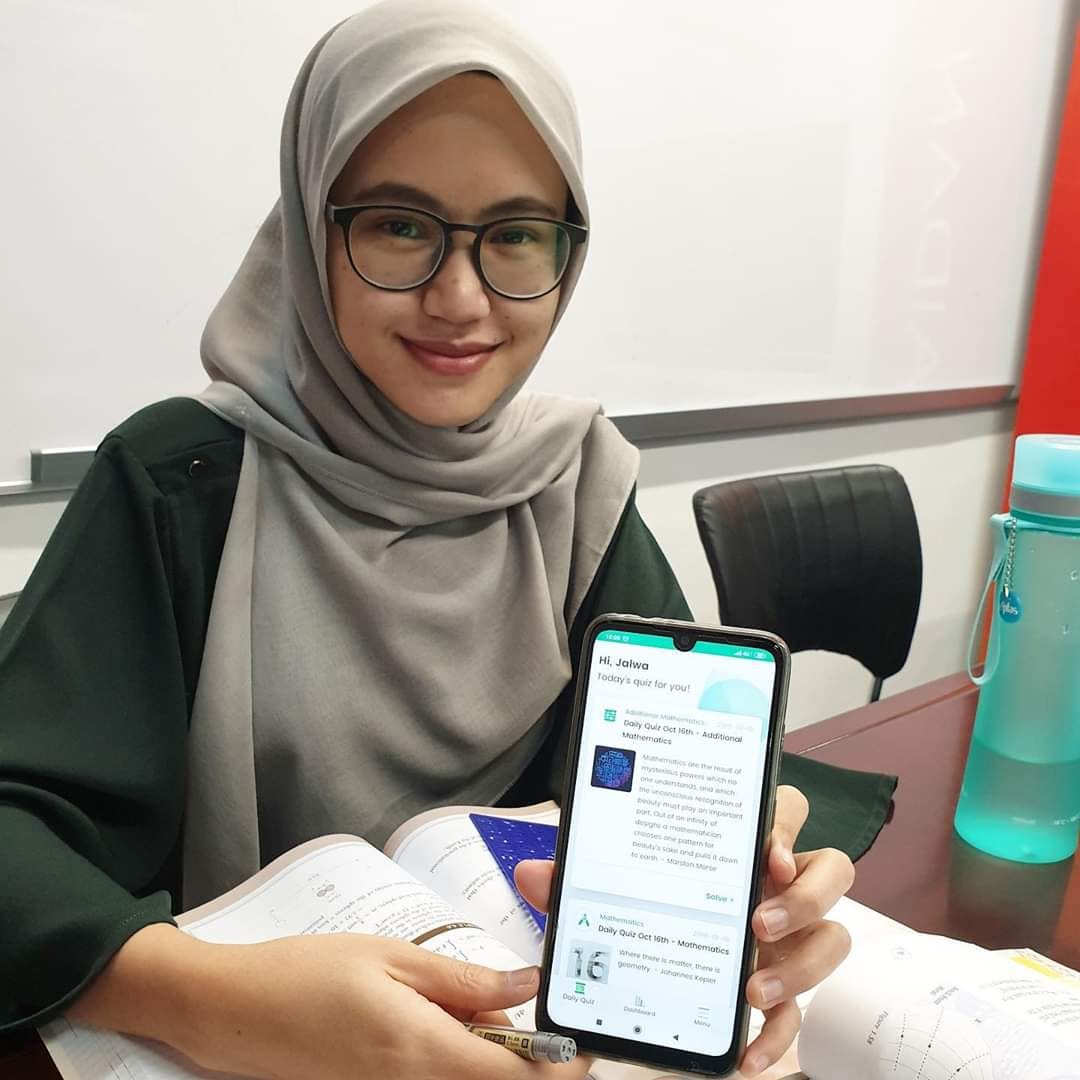Social Innovation: Promoting Local Economy And Enhancing Quality Of Life
In this latest instalment of Austral Media’s Rainforum, our expert panelists and host explored how digitalisation is changing the game for social entrepreneurs. . The virtual event consisted of a network of movers and shakers of the social impact ecosystem where you can be part of.
The panel comprised of YB Dato Sri Dr Haji Wan Junaidi Bin Tuanku Jaafar, MEDAC Minister, Viviantie Sarjuni, SCEIC General Manager, Sudarnoto Osman, SDEC CEO and Shamsul Nashriq, Austral Media Managing Director. The forum was moderated by host, Kamarul Bahrin Haron with a special performance by Anderson Kalang.
The forum also featured three social entrepreneurs, Sulie Lungkan Anak Anthony Abell, Founder of Sluvi Company, Heineken Anak Laluan, Founder of Syarikat Timogah and Juvita Tatan Wan, the Co-Founder of The Tuyang Initiative to present their social causes and ways the right help can improve the ecosystem.
Social Innovation: Promoting Local Economy And Enhancing Quality Of Life
Speaking at the Social Innovation: Promoting Local Economy And Enhancing Quality of Life Forum, YB Dato Sri Dr. Haji Wan Junaidi Bin Tuanku Jaafar, the Minister of Entrepreneur Development and Cooperatives (MEDAC) highlighted that the development cannot merely be represented by the growth of major cities in the country but also needs to come from the progress taking place in rural areas.
Referring to his home state, Dato Sri Wan Junaidi said more needs to be done to extend the connectivity and digital offerings urban dwellers currently enjoy to the 45% percent of state residents living in rural areas.
“While there have been efforts, the methods have not been as effective. Many have been left behind in terms of education and social development. Despite the popular notion that development is for all Malaysians, only the urban dwellers have reaped the advantages,” he said.
After taking over MEDAC in 2020, he said his Ministry’s efforts are in line with the first three Sustainable Development Goals which is to eliminate poverty, erase hunger and establish good health and well-being.
“We can only achieve these goals efficiently by encouraging Malaysians from all walks of life to get involved in generating economic opportunities for themselves but how do we do it? I believe it can be done in many ways and one of it is via social enterprises,” he shared.
However, he also highlighted that while the opportunity to do so is available, he acknowledged the struggles and difficulty in accessing them. The lack of financial help and recognitions from the banks or other financial institutions can be discouraging, he said.
As a result of the underlying problems, MEDAC is working on a blueprint that could benefit the community of social entrepreneurs in the country. The blueprint has been tabled before the cabinet and has received the green light to move forward. The Ministry is currently in the process of materialising it.
“We need to make sure all the government agencies need to be on the same page so they can help us and the potential social entrepreneurs in the country to be empowered. That is what I believe this blueprint can do,” Dato Sri Wan Junaidi said.
The blueprint will consist of the three aspects that will consider in recognising social enterprises and it includes the impact the enterprise has on the community, the beneficiaries it serves and the sustainable model it practices.
The Ministry along with the agencies involved will also be guiding potential enterprises through the blueprint to achieve the factors laid out to increase further participation of Malaysians in the social enterprise ecosystem.
Fellow panelist, Viviantie Sarjuni, General Manager at the Sabah Creative Economy and Innovation Centre shared those social enterprises can help to elevate the quality of life and has proven to have done so successfully during the first Covid-19 wave.
“Despite the disrupted revenue stream, they made sure the beneficiaries and the communities served remained as it was. There are currently 39 registered Social Enterprises in Sabah, and we are working closely with experienced players to further nurture the ecosystem here,” she said.
This year, the SCEIC had three collaborations with MaGIC, MDEC and Cradle, respectively and has impacted more than 500 people all together with startups under its wing receiving approximately RM 700,000 in investment.
The SCEIC also looks after three pillars – technology, creative industry, and startup (both tech and social enterprise). The centre has impacted more than 800 individuals in Sabah and around 300 startups through their capacity building programme.
Speaking on the matter of accessibility, Minister Wan Junaidi said that the MEDAC had received countless numbers of requests to provide ATMs for long houses and rural areas. However, without the proper access to connectivity and Wi-Fi, it would not be viable to set up ATMs in these areas.
“Which is why I came up with the idea of setting up mobile banking in these areas but there are still constraints and we need to tackle these challenges by going digital. MEDAC has always raised the matter of digitalising the informals, MSMEs and the social enterprises.
“By only focusing on the urban areas, these groups in the rural areas miss out on these advantages,” he said.
Both MEDAC and SME Corp has allocated RM3.11 million through the WarongKu platform and is expecting to benefit over 6,000 small traders. The cashless transactions are made with KiplePay payment terminals and gateway which provides consumers with the ability to make online payments with their preferred e-wallet provider including the KiplePay e-wallet.
Small traders who sign up as a WarongKu merchant will automatically be given a Kiple Merchant ID allowing hem to receive sales payments within two days.
The WarongKu platform comes after the recently launched Warong Rider.
Sudarnoto Osman, the Chief Executive Officer of Sarawak Digital Economy Corporation Berhad who expressed his agreement with Dato Sri Wan Junaidi’s push for digitalisation further said that more needs to educated those living in rural areas and give them the security and confidence in the accessibility banks can offer them.
“We need to look at the transaction flow between them and we have to change their mindset.”
He also spoke on the importance of working alongside social enterprise champions in Sarawak to execute these plans and empowering growing entrepreneurs to move to the next stage.
“The SDEC is working with players on the ground as digital partners to empower growing entrepreneurs and to support them in many ways as well,” he said.
Fellow panelist, Shamsul Nashriq, the Managing Director of Austral Media also shed light on the importance to focus on entrepreneurship and how it must be cultivated through literacy and awareness as well as the availability of access to develop the skills to strive in the ecosystem.
Business Shoutout
Pandai is a Social Enterprise registered with MaGIC. Our education platform aims to help Malaysian students revise their school lessons independently while maintaining their motivation using gamification elements.
With content aligned to the Malaysian National Curriculum, students from Year 1 to Form 5 are able to do topical quizzes which comes with detailed explanation for each answer, as well as timed mock exam papers in preparation for assessments in school.
In supporting students, Pandai actively engage Teachers and Parents with dedicated platforms to monitor the students' progress and achievements using a comprehensive report that can pin-point the exact topic which the student needs more support, and the level of thinking skills required.
For more information, reach out to them via https://www.pandai.org/
Both the Free and Premium versions of Pandai can be used online or on mobile devices using iOS and Android apps.
Whether its a feedback or if you would like to pitch your story to Head’s Up, feel free to get in touch with us via headsupnewsletter@gmail.com





